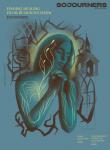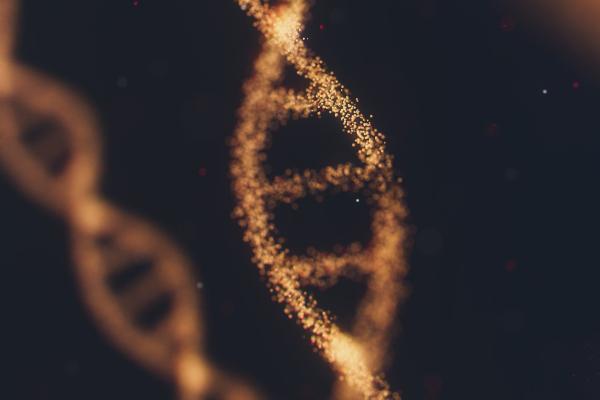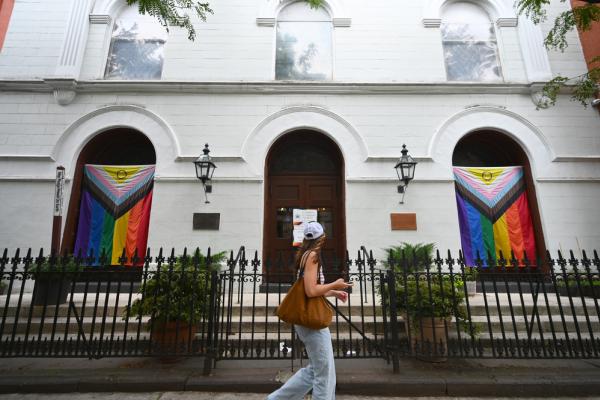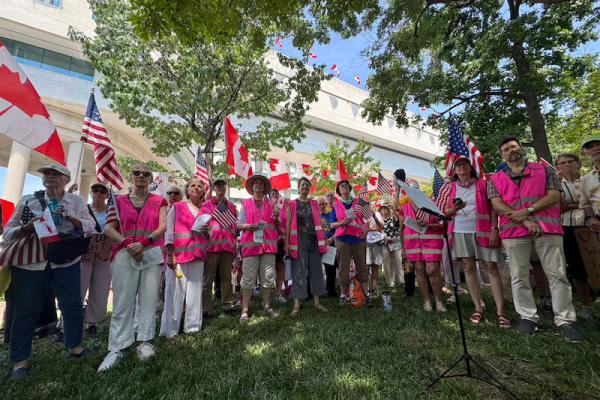IN 2012, a group of scientists from the University of Washington discovered Y chromosomes in the autopsied brains of female cadavers. Finding so-called male DNA in cis women’s bodies certainly complicates our notions of gender! But the focus then was on introducing the sci-fi-sounding concept of fetal microchimerism. Fetal cells, we learned, can remain integrated at the genetic level in someone’s body long after the fetus or baby is not. These cells can be passed on to future siblings, thus embedding visceral relations within our bodies that even the most adept family-systems theorist would struggle to disentangle.
The scientific community labeled this a discovery. But for anyone already skeptical of the mind-body dualisms in Western culture, this was simply science catching up with how we already experience our ancestral relations. Intergenerational wisdom and trauma aren’t simply intellectual concepts. Rather, our ancestors’ presence in our lives connects at sites where body, spirit, mind, and soul inextricably intertwine. And these sites are in desperate need of some decolonizing attention if we’re to reclaim our ancestral relations in our practices of Christian faith. Of course, that might not be something we all want to do. But this month, I’ll engage the lectionary readings through this lens to see what questions and insights might arise. And I’ll do so with the hope that our wide, wondrous communion of saints will read along with us.
October 1
Ancestral Culpability?
Ezekiel 18:1-4, 25-32; Psalm 25:1-9; Philippians 2:1-13; Matthew 21:23-32
MY SETTLER STUDENTS often respond to discussions about colonialism with something like, “I’m not to blame for my distant ancestors’ actions!” In so doing, they evade the more difficult question I’m asking: What multigenerational legacy of inheritance did our ancestors leave us that lets us feel entitled to the land from which others are alienated? This isn’t about blame, I tell them. It’s about making sure to ask how what has happened shapes what exists, before trying to figure out what the heck to do about it now.
I sympathize with their frustration because I resonate with it — just as I resonate with the Israelites’ frustrations about exile that we encounter in Ezekiel. God won’t stop talking in unsolvable riddles! “But if we knew who to blame for us being in exile, perhaps we could fix it,” the people say. “Who are you punishing: our ancestors or us?”
“Not your ancestors!” God quickly infers, “but also not you,” God adds (see verses 25-28). And in so doing, God removes their capacity to fall back on a moral tradition of intergenerational punishment or one of overly individualized personal responsibility. “For I have no pleasure in the death of anyone, says the Lord. Turn, then, and live” (verse 32). If God wants the exiles to repent, be transformed, and come home — or, better, reimagine what it means to come home — then perhaps God wants something similar from those of us wondering what to do about our distant ancestors’ actions.
October 8
Ancestral Identity
Isaiah 5:1-7; Psalm 80:7-15; Philippians 3:4-14; Matthew 21:33-46
IT'S DIFFICULT TO go against the grain of expectations, especially those we’ve set for ourselves. So, when Paul claims to the church at Philippi, “If anyone has reason to be confident in the flesh, I have more” (3:4), I wonder if he’s not trying to convince others so much as trying to convince himself. I hear him asking, “Why would I give this all up to follow a God who sacrificed not just his divinity, but his life?”It’s a fair question.
Wrestling with ancestral inheritance leads some of my students to ask questions about culpability. It leads others to ask questions about identity. The straight, white, cis man’s upper-middle-class parents are already disappointed he’s choosing to be a minister rather than a doctor, banker, or lawyer. “So, who am I,” he asks me, “if I’m no longer these things?”
When I wrestle with my own social privilege, I find kinship with Paul and my students. “Whatever gains I had,” I say with them, “these I have come to regard as loss because of Christ” (verse 7). Further, I “want to know Christ and the power of his resurrection ... not that I have already obtained this,” I add, “but I press on to lay hold of that for which Christ has laid hold of me” (verses 10-12). Speaking these words in chorus with Paul and my students, I’m reminded that just as I carry my ancestors in my body, I too am held in Christ’s body. And none of us is doing this work alone.
October 15
Ancestral Rest
Isaiah 25:1-9; Psalm 23; Philippians 4:1-9; Matthew 22:1-14
THE COMBAHEE RIVER Collective famously claimed, “If Black women were free, it would mean that everyone else would have to be free since our freedom would necessitate the destruction of all the systems of oppression.” If there were a child of Combahee River Collective and God’s promise of rest in Psalm 23, that baby’s name would be Tricia Hersey — aka, the Nap Bishop.
Hersey is an artist, activist, womanist theologian, and mother of the “rest as resistance” movement. The Nap Bishop isn’t your typical (read: white) self-care lifestyle guru, though. Hersey calls out such peddlers for reproducing the white supremacist, capitalist systems of oppression that she dismantles snooze by snooze. These systems, Hersey argues, make it impossible to see a body at rest without categorizing it as lazy — particularly if that body is Black or brown. But, Hersey argues, rest is reparations: both back pay for her ancestors’ labor and a down payment on a new world where Black women — and thereby all of us — are free.
As a mixed-race reader of Hersey with white-skin privilege, I receive her vision as both a promise and a call to responsibility. If I refuse to lie down in green pastures and be restored (Psalm 23: 2-3), it’s not only me who pays the price. The capitalist system that rewards my overwork not only lines the pockets of those who have more than I do but also takes payment from those who have less. So, I must rest before collapsing with exhaustion if I want my rest to serve as resistance. Only that kind of rest serves as reparation, in every sense of the word — the rest beside still waters of the Combahee River.
October 22
Outside and Inside
Isaiah 45:1-7; Psalm 96:1-13; 1 Thessalonians 1:1-10; Matthew 22:15-22
MY ANCESTRY IS complicated. On my mum’s side, we were classified as colored under South Africa’s apartheid system and trace ourselves to the Indigenous Khoekhoen people and Huguenot missionaries. On my dad’s side, we’re white, working-class, from a small village in England. My DNA is both colonized and colonizer. My Western dualist ways of knowing obscure ancestral ways of relating that I want to rediscover.
I have a communion of ancestral saints in Christ as well. For example, through Paul’s salutations to the church at Thessalonica, I greet my uncles and cousins: Paul, Silvanus, Timothy, as well as the Thessalonians, Macedonians, and Achaeans to whom that church witnessed. And when Cyrus is “surnamed” as God’s anointed in Isaiah 45, I’m reminded that God has been grafting outsiders into Israel since long before Christians were grafted in through Christ (see Romans 11:17-24). Reading scripture with my ancestors, then, is to read from both inside and outside the pages. Reading scripture as an ancestral story, I find myself in the stories in a less individualistic way, asking less often, who am I in this narrative? And more often, what wild and wondrous thing is my family up now?
October 29
Ancestors to Descendants
Leviticus 19:1-2, 15-18; Psalm 1; 1 Thessalonians 2:1-8; Matthew 22:34-46
READING SCRIPTURE ANCESTRALLY has created a fresh context for interpreting this instruction from Leviticus 19: “You shall not hate in your heart anyone of your kin” (verse 17). We’ve seen all the ways our kin reside in us — genetically, spiritually, and more. To hate my kin, then, is to direct my hate toward my own source of life. And I don’t have good enough aim to risk that. Better just to flood that space with love.
Matthew’s gospel also tells us to love God with all that we are: We are to love God with the weight of our ancestors’ love for us. And then, we’re to love our neighbor as ourselves, bringing all the love of our ancestors to bear on all of those whom we encounter. Reading the Golden Rule ancestrally removes it from the common critique that it is little more than individualistic self-projection. Shouldn’t we love our neighbor as they want to be loved rather than how we do? Reading the Golden Rule ancestrally directs our attention to the interconnectedness of all life — past, present, and future. “Love your neighbor according to their place in our shared ancestral web,” we might say. Moreover, what might it look like to love our neighbors in such a way that together we can bless all our descendants?

Got something to say about what you're reading? We value your feedback!






